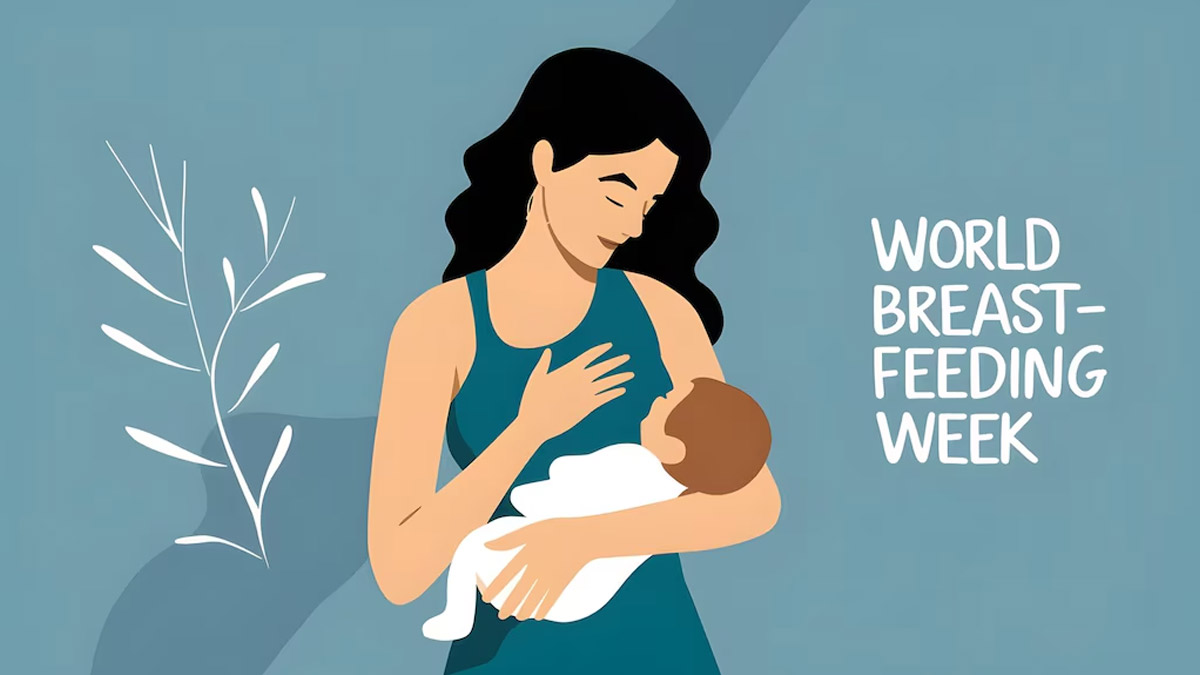
Motherhood is a profound journey that begins with the nine months of carrying a baby in the womb, the intense pain and joy of childbirth, and the nurturing phase, where the mother works towards caring for her newborn. This involves breastfeeding, a natural process that ensures the well-being of both the mother and the baby.
Table of Content:-
Every year, from August 1–7, we observe World Breastfeeding Week to highlight the importance of breastfeeding and the need to provide support to nursing mothers. In today's world, where commercialised products have taken over, formula milk has become a preferred alternative to breast milk. However, many experts continue to urge mothers to breastfeed, as it has significant benefits.
To shed light on the same, the OnlyMyHealth team interacted with experts who explained the advantages of breastfeeding over formula feeding.
Also Read: Breastfeeding After 35: Expert List Tips to Keep Your Baby Healthy
Breastfeeding Recommendations

The World Health Organization (WHO), along with UNICEF, recommends that children initiate breastfeeding within the first hour of birth and be exclusively breastfed for the first six months of life. This means that children younger than six months should not be given anything other than breastmilk, including water.
Dr Kanti Sahu, Consultant Gynaecologist, Apollo Clinic, Marathahalli, suggests that breast milk provides an all-in-one kind of nutrient material, immune factors, and digestive enzymes uniquely suited to the baby’s needs, guaranteeing maximum nourishment and defence against diseases.
"As a result, this helps in fighting infections while reducing the chances of chronic ailments like obesity, diabetes, or allergy reactions. More so, it aids digestion and lessens gastrointestinal troubles," she adds.
When it comes to breastfeeding, the global health organisation also shares that infants should be breastfed on demand, meaning whenever they want, day and night.
What Is Formula Milk?

Formula milk is an alternative to breastmilk, usually made from cows' milk that has been treated to make it more suitable for babies, explains the United Kingdom National Health Services (NHS).
It either comes in a dry powder, which needs to be combined and mixed with water, or a ready-to-feed liquid formula, which is more convenient and could be more expensive. While formula milk also provides nutrients to the baby, the NHS shares that it does not have the same benefits as breastmilk.
Experts often recommend formula feeding in unforeseen circumstances, where the mother and the child cannot be together, if the mother has health issues that require drug administration, which could be harmful for the child, or when the mother does not produce enough milk.
Breastfeeding Vs. Formula Feeding: Making The Right Choice For You And The Baby

In an interaction with the OnlyMyHealth team, Sushma Shende, Program Director of SNEHA NGO's Maternal and Child Health, lists a few benefits that breastfeeding offers. These include:
The nutrients in breast milk are designed perfectly for an infant’s needs, with antibodies that protect it from infections.
- Breastfeeding protects babies from common illnesses like diarrhoea and pneumonia. This is because mothers’ milk provides the active transfer of antibodies as well as live cells, which protect babies.
- Breast milk is easier to digest for babies to get nutrients from than formula milk.
- The chances of being diagnosed with long-term illnesses, including asthma, obesity, and type 1 diabetes, are lower in infants who are breastfed.
Also Read: Are You Unable To Produce Enough Breast Milk For Your Baby? Here Are Remedies
Dr Sahu adds that breastfeeding helps mothers develop close emotional relationships with their children, thus playing a fundamental role in the child’s emotional and mental growth.
Compared to formula, which requires careful preparation and even storage, breast milk is the only food that remains fresh at all times, at an ideal temperature, and devoid of any contaminants. Not to mention how economical breastfeeding is.
While formula feeding is safe and effective for babies, breastfeeding is the healthiest option for both the mother and the baby.
Additionally, the WHO suggests that breastfeeding can boost intelligence in children and can also reduce the risk of obesity and diabetes later in life. For breastfeeding mothers, it can reduce the risk of breast and ovarian cancer.
Also watch this video
How we keep this article up to date:
We work with experts and keep a close eye on the latest in health and wellness. Whenever there is a new research or helpful information, we update our articles with accurate and useful advice.
Current Version
